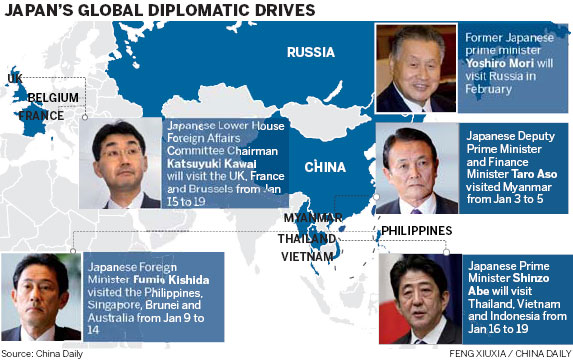The Australian foreign minister conveyed Canberra's neutral stance on Japan's territorial dispute with China to his Japanese counterpart on Sunday.
Their meeting came amid Tokyo officials' attempts to win regional countries' support for their plans to rein in China on maritime issues.
 |
Japan has said it is trying to promote economic and security cooperation yet is still trying to contain China in maritime disputes. Observers said those attempts will increase regional tensions rather than reduce them.
Japanese Foreign Minister Fumio Kishida and Australian Foreign Minister Bob Carr exchanged their views on various regional security issues, including Pyongyang's rocket launch and the Republic of Korea during their meeting on Sunday, Xinhua News Agency cited Carr's spokesman as saying.
Ahead of his first overseas trip as foreign minister, Kishida in Tokyo had stressed the importance of strengthening Japan's ties with members of the Association of Southeast Asian Nations and Australia.
"Amid the changing strategic relationship within the Asia-Pacific region, securing cooperation between ASEAN countries and Australia is important to maintaining peace and stability in the region," Kishida told journalists in Tokyo last week.
Kishida's message was not particularly well received in Australia. Canberra has resolutely avoided taking a side in territorial disputes and will resist any attempts at drawing it into a conflict with China-Australia's main economic partner, Xinhua reported.
As relations between China and Japan become more tense ― as a result of Japan's illegal "purchase" of the Diaoyu Islands, which have been under Chinese sovereignty since ancient times ― many countries are trying to avoid displeasing China, said Wang Ping, a researcher on Japan studies at the Chinese Academy of Social Sciences.
Australia was the last destination Kishida visited on a six-day voyage that also took him to the Philippines, Singapore and Brunei.
Kishida has tried to use the trip to consult his counterparts on issues concerning maritime cooperation between their countries and Japan, saying China has "become increasingly assertive" in matters pertaining to the East China Sea and the South China Sea, Japan's Kyodo News Agency wrote.
After Kishida's trip to Asia-Pacific countries, Japanese Prime Minister Shinzo Abe will go on his first state visits in his current term as the country's top lawmaker. He is scheduled on Wednesday to start a voyage that will eventually take him to Thailand, Vietnam and Indonesia, Yoshihide Suga, Japanese chief cabinet secretary, told media on Thursday.
The trip's purpose is to strengthen economic and security cooperation with Southeast Asian countries, China Central Television reported.
Southeast Asian countries with large markets and rich supplies of resources will play an important role in Japan's economy. The trips also show Japan is trying to win the political support of these countries, an achievement that would give it more confidence in its disputes with China, Wang said.
On Sunday, Abe visited Japan's Shinto shrine, which commemorates Emperor Meiji, a symbol of Japan's rise to become a global military power in the late 19th and early 20th centuries.
"This petty action, alongside those trips to drum up support, shows Abe's policies, which should place the top priority on improving the domestic economy, are misdirected," Wang said.
Yang Baoyun, a professor on Asia-Pacific studies at Peking University, said Japan is trying to strengthen its ties with Asia-Pacific countries to accommodate the United State's strategic pivot toward the region.
Japan is meanwhile eager to win the support from non-regional powers.
Japan's NHK Television reported Abe will send Katsuyuki Kawai, lower house foreign affairs committee chairman, as his envoy to the North Atlantic Treaty Organization to convey a message calling for closer ties.
Kawai will arrive in Brussels on Wednesday and is to hand Anders Fogh Rasmussen, NATO secretary-general, a letter from Abe.
Abe is expected to say in the letter that Japan is ready to assume a more active role in securing stability and prosperity in East Asia. Japan is also expected to tell NATO that strategic conditions have changed, the NHK said.